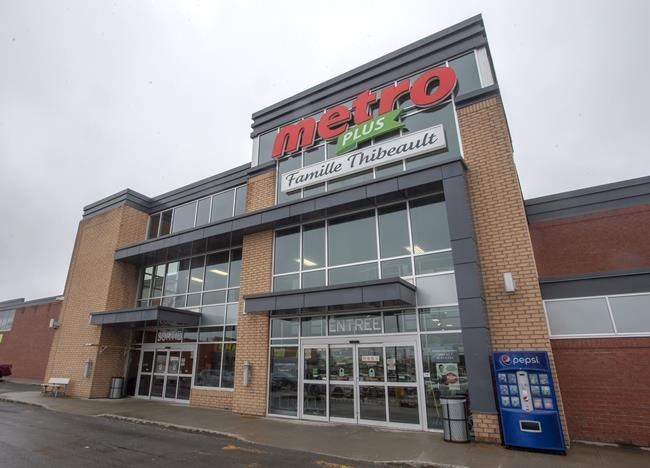Metro Inc. reported higher sales and earnings as the effects of a Toronto-area strike were offset by an extra week in its fourth quarter, but the grocer tempered its outlook for the coming year due to the expected costs of investing in facilities in Quebec and Ontario.
President and CEO Eric La Fleche said Wednesday that fiscal 2024 will be a "transition year" for the grocer.
"There's a lot of moving pieces, a lot of work," he said on a conference call with analysts.
"We're confident that it's going to go well, but ... it's going to cost money to do that, especially in the first year."
The company said it's ramping up a new distribution centre north of Montreal and the expansion of its Montreal produce facility. It's also preparing to launch the final phase of its automated fresh facility in Toronto next spring.
Though Metro said these investments position the company well for long-term profitable growth, it's facing "significant headwinds" in the coming financial year due to "temporary duplication of costs and learning curve inefficiencies, as well as higher depreciation and lower capitalized interest."
Because of these headwinds, Metro forecasts adjusted net earnings per share next year to be flat to down 10 cents, and said it expects to resume profit growth in its 2025 financial year.
The grocery business has thin margins, said Lisa Hutcheson, a retail strategist at J.C. Williams Group. Even shaving a little bit off can help the company’s bottom line, she said.
“If these investments can ... make some kind of savings, it’s definitely worth the investment.”
The grocer's outlook for its 2024 financial year was "cautious and unusually specific," RBC analyst Irene Nattel said in a note. Investors will likely be disappointed in the outlook for the coming year, she said, but noted the company's strong track record.
Metro's stock price closed down 6.81 per cent on Wednesday, at $70.43.
The company reported a fourth-quarter profit of $222.2 million, up from $168.7 million in the same quarter last year as its sales rose 14 per cent.
The grocer said the profit amounted to 96 cents per diluted share for the 13-week period ended Sept. 30, up from 70 cents per diluted share a year earlier when the quarter ran 12 weeks.
The five-week strike at 27 stores in the Greater Toronto Area during the quarter had a negative impact on Metro's bottom line of about $27 million after taxes or 12 cents per share, the company said, but the 13th week in the period had a favourable impact of the same amount.
Workers went on strike at the end of July after rejecting their first tentative deal with Metro. The strike grew to to include secondary picketing at distribution centres before a deal was reached at the end of August.
Sales in the quarter totalled $5.07 billion, up from $4.43 billion a year earlier, as food same-store sales rose 6.8 per cent and pharmacy same-store sales gained 5.5 per cent.
Sales for the full year exceeded $20 billion for the first time in the company's history, noted La Fleche, reaching $20.7 billion, while earnings for the full year were $1.0 billion.
On an adjusted basis, Metro said it earned 99 cents per share in its latest quarter, up from an adjusted profit of 92 cents per diluted share a year earlier.
La Fleche said trends from the past year and a half continued during the latest quarter, with shoppers continuing to shift to discount stores. That shift helped boost food same-store sales, he said.
However, the discount grocery segment has also become more competitive as other grocery companies add or convert more stores, La Fleche said.
"As more discount square footage is being added to the market, it's having an impact for sure. But we're well positioned to continue to grow in that market," he said.
During the past fiscal year, Metro opened three Super Cs in Quebec and converted a Metro store to a Super C, one of the company's discount banners, said La Fleche. In Ontario, it opened two Food Basics stores, another discount banner. In the upcoming fiscal year, La Fleche said Metro is budgeting eight new discount stores, including two conversions.
Similar to previous quarters, private-label sales continued to outpace national brands, said La Fleche.
Hutcheson noted private-label products tend to have slightly higher margins for grocers.
"It helps the margin while also helping the consumer because the prices are lower," she said.
Metro and the other major grocers in Canada have been under pressure to stabilize food prices, and this fall they presented plans to the federal government to tackle rising prices through discounts, price freezes and price-matching.
On the conference call, La Fleche said Metro is still receiving price increase requests from big suppliers, which it will "negotiate as much as possible." He said the grocer's food basket inflation measurement during the quarter was around 5.5 per cent, lower than food inflation across the country and lower than its third quarter.
This report by The Canadian Press was first published Nov. 15, 2023.
Companies in this story: (TSX:MRU)
Rosa Saba, The Canadian Press



